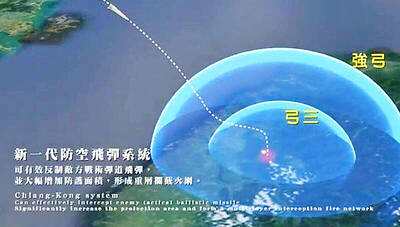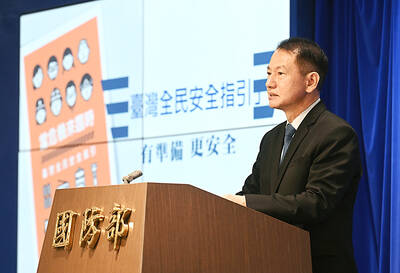China has issued new regulations on the filtering of mobile phone short-text messages in a move that expands its censorship controls over wireless technologies and the Internet, state press said yesterday.
The "Self-Discipline Standards on Content in Mobile Short Messaging Services" were issued recently and are aimed at weeding out pornographic, fraudulent and illicit messages, Xinhua news agency reported.
The standards provide the framework for China Mobile Corp, the country's largest mobile phone service provider, to contract out the policing and filtering of short messages for content deemed unhealthy or fraudulent, the report said.

PHOTO: AP
So far 10 such companies have begun the policing work in 20 categories of content that are spelt out in an earlier agreement or "treaty" on content between the government and Internet Service Providers.
China maintains some of the toughest Internet regulations in the world and has reportedly up to 30,000 people policing the Internet for subversive political content and pornography.
"Cyber-dissidents" who post political views on the Internet that are opposed to official Communist Party views are routinely rounded up and jailed for subversion.
According to the Paris-based Reporters Without Borders, the new short-messaging regulations could further lead to the crackdown on political dissidents sending messages via mobile short messages.
"The Chinese authorities are making ever greater use of new technology to control the circulation of news and information. In the past months we have been witnessing a real downturn in press freedom particularly on the Internet," the group said in a statement.
"The international community should react against this hardening by the Chinese regime," the statement said.
It said that instant text messaging helped expose the governments attempts to cover up the SARS outbreak last year.
According to the group, the Chinese firm Venus Info Tech Ltd, has already begun to filter mobile phone messages for key words to pinpoint "reactionary" text senders.
"Its surveillance system would allow it to home in on `false political rumors' and `reactionary remarks' among others," Reporters Without Borders said, citing a press release from the company.
According to Xinhua, over 220 billion text messages were sent in China last year, making up some 55 percent of the world's text messages.

LIMITS: While China increases military pressure on Taiwan and expands its use of cognitive warfare, it is unwilling to target tech supply chains, the report said US and Taiwan military officials have warned that the Chinese People’s Liberation Army (PLA) could implement a blockade within “a matter of hours” and need only “minimal conversion time” prior to an attack on Taiwan, a report released on Tuesday by the US Senate’s China Economic and Security Review Commission said. “While there is no indication that China is planning an imminent attack, the United States and its allies and partners can no longer assume that a Taiwan contingency is a distant possibility for which they would have ample time to prepare,” it said. The commission made the comments in its annual

DETERMINATION: Beijing’s actions toward Tokyo have drawn international attention, but would likely bolster regional coordination and defense networks, the report said Japanese Prime Minister Sanae Takaichi’s administration is likely to prioritize security reforms and deterrence in the face of recent “hybrid” threats from China, the National Security Bureau (NSB) said. The bureau made the assessment in a written report to the Legislative Yuan ahead of an oral report and questions-and-answers session at the legislature’s Foreign Affairs and National Defense Committee tomorrow. The key points of Japan’s security reforms would be to reinforce security cooperation with the US, including enhancing defense deployment in the first island chain, pushing forward the integrated command and operations of the Japan Self-Defense Forces and US Forces Japan, as

INTERCEPTION: The 30km test ceiling shows that the CSIST is capable of producing missiles that could stop inbound missiles as they re-enter the atmosphere Recent missile tests by the Chungshan Institute of Science and Technology (CSIST) show that Taiwan’s missiles are capable of intercepting ballistic missiles as they re-enter the atmosphere and pose a significant deterrent to Chinese missile threats, former Hsiung Feng III missile development project chief engineer Chang Cheng (張誠) said yesterday. The military-affiliated institute has been conducting missile tests, believed to be related to Project Chiang Kung (強弓) at Pingtung County’s Jiupeng Military Base, with many tests deviating from past practices of setting restriction zones at “unlimited” and instead clearly stating a 30.48km range, Chang said. “Unlimited” restrictions zones for missile tests is

PUBLIC SAFETY: The nationwide distribution campaign aims to enhance society’s overall understanding of threats and bolster defense awareness, an official said The latest edition of the National Public Safety Guide is being mailed to all citizens starting today to foster public awareness of self-defense in the event of war or natural disasters, the Ministry of National Defense said yesterday. “The guides will be disseminated to the public to enhance society’s overall understanding of threats and bolster defense awareness, demonstrating the government’s emphasis on people’s safety and its determination to pursue self-defense,” All-out Defense Mobilization Agency Director Shen Wei-chih (沈威志) said at the ministry’s news conference. The nationwide distribution campaign was planned according to President Lai William’s (賴清德) Sept. 20 directive, he said, adding